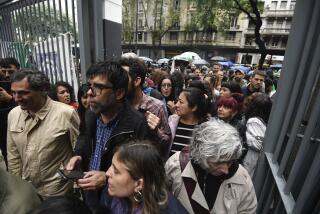Czech Merchants Protest Plans to Sell Their State-Owned Shops : Capitalism: Employees fear jobs will be lost in transition from communism to a market economy.
- Share via
PRAGUE, Czechoslovakia — Merchants and restaurateurs shuttered thousands of state-owned shops across the country Thursday to protest government plans to auction off their workplaces to private owners.
The labor action demanding that workers be given preferential conditions to buy into their own firms threatens to escalate and signals a souring of the public mood toward the new democratic government.
It also illustrates the difficulty that workers in the former Communist nations have in coping with some unfamiliar, and what they see as unfair, demands of capitalism.
Parliament has not yet endorsed details of the government plan to privatize 70,000 small businesses beginning this fall. But a published draft of the government proposal has angered employees of retail and service shops who fear for their jobs and their chances of participating in Czechoslovakia’s transition to a market economy.
To protest the competitive bidding that the state intends to use to extract itself from the service industry, Czechoslovak waiters and hairdressers, shoe repairers and kiosk clerks posted strike signs at 3 p.m. and turned away customers for three hours.
“We don’t want auctions, because then we could be bought out by the local Mafia--the former Communist Party officials and money changers and others who have benefited from corruption,” protested Jaroslav Novy, manager of the Staromestska Restaurant named for the cobblestone square in central Prague where it stands.
“There’s too much uncertainty about the future in the country now,” Novy lamented, huddled with fellow strikers in a room off the cluttered kitchen he oversees. “I understand that the government is under pressure to do something, but this is not the way it should proceed.”
The strikers said they want the state to set a price for each enterprise so workers can pool their funds to form ownership cooperatives. They also objected to a proposed requirement that a 50% down payment on each business be made in cash.
“I’ve been here for 21 years, starting out as the lowliest waiter,” said Jiri Svoboda, manager of the Green Frog Restaurant tucked into the executioner’s quarters of a 17th-Century palace. “I should be allowed to own part of this restaurant, but I’ve raised four children and have no money.”
The labor unrest began Wednesday with a symbolic one-hour closure, which was expanded to three hours Thursday to step up the pressure. Czechoslovak Radio said 1,750 shops were shut down in northern Moravia, and that the strike appeared to have been broadly observed across the rest of the country as well. The national Confederation of Trade Unions, which had encouraged only a five-minute warning strike, said the protest action threatened to get out of hand.
Thursday’s strikes were the most extensive labor unrest to hit Czechoslovakia since its peaceful revolt against communism last November.
“Unfortunately, the government is talking more to economists than with the people like us who want to own businesses,” said Marian Sykora, a food-service worker at the Prince Restaurant.
President Vaclav Havel met with federal and republic government leaders to discuss the public backlash but emerged from the daylong talks to confirm that the leadership won’t artificially manipulate conditions for the selloff to favor employees.
He told Czechoslovak television after the meeting that special bank loans will be made available to groups of employees to finance up to half of the cost of their enterprises. But the 50% down-payment requirement could exclude many ordinary workers who have little or no savings on which to draw.
More to Read
Sign up for Essential California
The most important California stories and recommendations in your inbox every morning.
You may occasionally receive promotional content from the Los Angeles Times.











